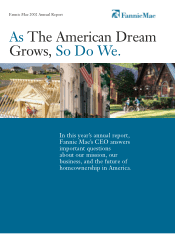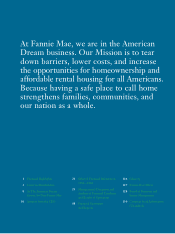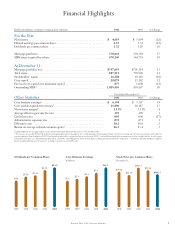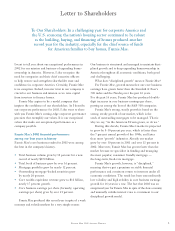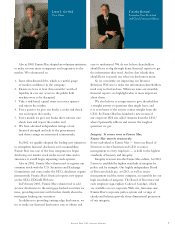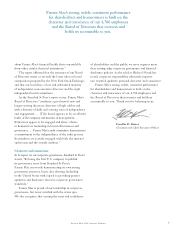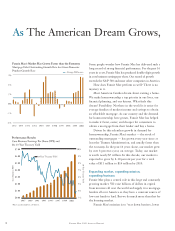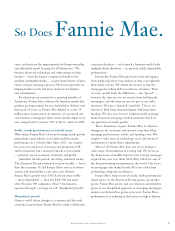Fannie Mae 2002 Annual Report Download - page 6
Download and view the complete annual report
Please find page 6 of the 2002 Fannie Mae annual report below. You can navigate through the pages in the report by either clicking on the pages listed below, or by using the keyword search tool below to find specific information within the annual report.
4FANNIE MAE 2002 ANNUAL REPORT
Fannie Mae produced this record year
in spite of a weak economy and volatile
markets for a very simple reason:
Our business is structured and managed
to maintain disciplined growth and
to keep expanding homeownership in
America throughout all economic
conditions, both good and challenging.
Daniel H. Mudd
Vice Chairman and
Chief Operating Officer
Performance for Fannie Mae shareholders
is crucial to our mission
Fannie Mae’s performance for you, our shareholders, is
crucial to our company. Your ownership makes possible
our mission and business of expanding homeownership
in this country, offering every family regardless of their
means a better chance to achieve the American Dream.
By growing our earnings and providing you with a good
return, we can grow our capital. By growing our capital,
we can grow our business. As Fannie Mae’s business
grows, so do the benefits we provide — lower-cost
mortgage funds — to more and more families in America.
For example, our disciplined business growth has
steadily increased our core business earnings from 39
cents a share in 1987 to $6.31 in 2002, and we just
increased the dividend on our common stock by 18 percent,
which reflects our confidence in our earnings going forward.
At the same time, our disciplined growth also lowers
conventional conforming mortgage rates. You can see
this result in the mortgage rate charts published every
Saturday in the real estate section of most newspapers.
The mortgages Fannie Mae finances are always cheaper
than the jumbo loans listed there, and much cheaper
than subprime loans; we save home buyers anywhere
from $11,000 to as much as $200,000 over the life of
their loans. Furthermore, since 1987, the maximum loan
amount eligible for Fannie Mae’s financing has more
than doubled from around $150,000 to over $300,000,
which means more homeowners can benefit from
our service.
Thus, Fannie Mae’s disciplined growth brings the
interests of shareholders and the interests of home buyers
into perfect alignment. Our mission and our business
complement each other. Your ownership of Fannie Mae
makes more homeownership possible for more Americans.
Fannie Mae’s governance principles: openness,
integrity, responsibility, accountability
What fuels the success of our mission and business are the
principles that underly our approach to corporate governance
and management: Openness. Integrity. Responsibility.
Accountability. Fannie Mae puts a premium on upholding
these simple, core principles in our corporate mission,
business, and culture for an important reason: Trust is
uniquely crucial to our company.
Fannie Mae’s mission is to raise private capital from
investors in America and all over the world so that home
buyers across our nation have a steady source of low-cost
funds to finance homes. So we must earn and ensure the
trust of investors, shareholders, and other stakeholders
every day.
To earn and ensure that trust, Fannie Mae operates
by the following principles of corporate governance:
Openness. Fannie Mae’s standard is to maintain
best-in-class financial disclosures.
Our goal is to provide investors, shareholders, and other
stakeholders with the clear, comprehensive information they
need to understand and have confidence in Fannie Mae and
make our financial disclosures easy to obtain and use. In our
financial disclosures, we strive to provide more than is
required, and anticipate and address fundamental questions
about our company and business.
Our focus on transparency is not a new phenomenon
for Fannie Mae.
In 2000, we revealed the 14 decision factors of our auto-
mated mortgage underwriting system, Desktop Underwriter,
so that lenders and borrowers could better understand
our loan decision process and remedy any issues that arise
with a loan application. We even started using our own
credit assessment model so we could reveal those factors too.

